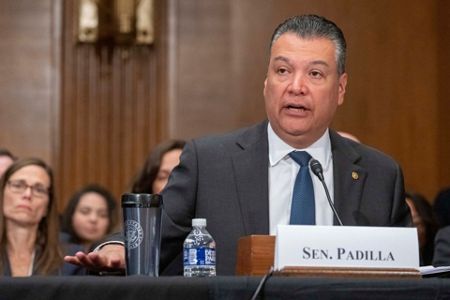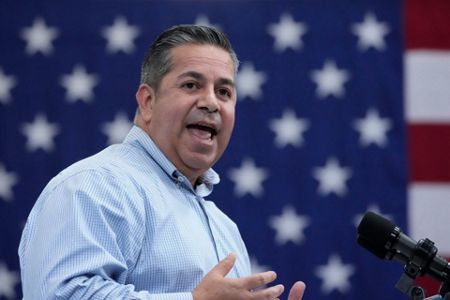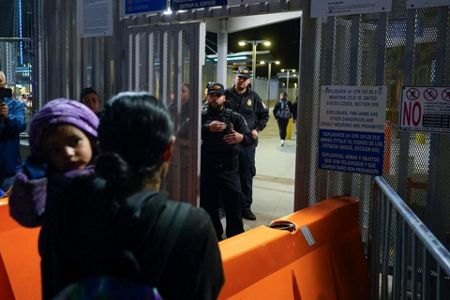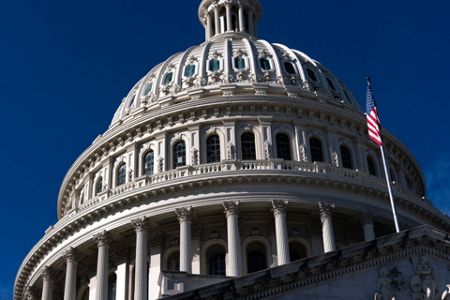WASHINGTON (AP) — Prominent Latinos in Congress looked on quietly, at first, privately raising concerns with the Biden administration over the direction of border security talks.
Democratic Sen. Alex Padilla of California was on the phone constantly with administration officials questioning why the Senate negotiations did not include any meaningful consideration of providing pathways to citizenship for longtime immigrants lacking the proper legal documents.
New Mexico Democrat Sen. Ben Ray Luján made similar arguments as he tried to get meetings with top-level White House officials.
But when the talks didn't seem to make enough difference, the influential lawmakers started leading the open opposition.
“A return to Trump-era policies is not the fix,” Padilla said. “In fact, it will make the problem worse.”
Padilla even pulled President Joe Biden aside at a fundraiser last weekend in California to warn him “to be careful” of being dragged into “harmful policy.”
The Latino senators have found themselves on shifting ground in the debate over immigration as the Democratic president, who is reaching for a border deal as part of his $110 billion package for Ukraine, Israel and other national security needs, has tried to reduce the historic numbers of people arriving at the U.S. border with Mexico.
The negotiations, which intensified Saturday at the Capitol as bargainers race to draft a framework by this weekend, come as the Biden administration has increasingly endured criticism over its handling of border and immigration issues — not just from Republicans, but from members of the president’s own party as well. Democratic cities and states have been vocal about the financial toll that they say migrants have been taking on their resources.
But left off the table in the talks are pro-immigration changes, such as granting permanent legal status to thousands of immigrants who were brought to the U.S. illegally as children, often referred to as “Dreamers,” based on the DREAM Act that would have provided similar protections for young immigrants but was never approved.
A few days after his conversation with the president, Padilla, Luján and Sen. Bob Menendez, D-N.J., aired their concerns prominently at a Congressional Hispanic Caucus news conference in front of the Capitol.
They slammed Senate Republicans for demanding the border policy changes in exchange for Ukraine aid, and they criticized Biden for making concessions that they say ultimately undermine the United States' standing as a country that welcomes immigrants.
Padilla said Senate Majority Leader Chuck Schumer, D-N.Y., has promised him and several other senators to allow them to see proposals before there is a final agreement. But Latino lawmakers have largely been left outside the core negotiating group.
On Saturday, White House Chief of Staff Jeff Zients spoke on a call with the Hispanic Caucus, and several lawmakers raised concerns, according to two people granted anonymity to discuss the situation.
Homeland Security Secretary Alejandro Mayorkas, who had been engaged in talks at the Capitol, also joined the call.
Biden is facing pressure from all sides. He has been criticized about the record numbers of migrants at the border and he is also trying to address the political weakness before a potential campaign rematch next year with Donald Trump, the former Republican president, who has promised to enact far-right immigration measures.
And the issue is now tied to a top Biden foreign policy goal: providing robust support for Ukraine's defense against Russia.
The White House and Senate leaders are pushing for a framework of the border deal by Sunday, in preparation for possible votes in the week ahead.
“We’ll need to have some kind of framework by the end of the weekend,” Sen. James Lankford of Oklahoma, the key Republican negotiator, said Saturday during a break in talks.
Recently during the negotiations, the White House has pushed to include provisions that would legalize young immigrants who came to the U.S. illegally as children, according to two people with knowledge of the closed-door talks. But others said that was quickly taken off the table by Republicans.
Senators said they are running into the complex nature of U.S. immigration law. “Byzantine,” said Sen. Chris Murphy, D-Conn..
“We’re not at an agreement, but as we get closer into an agreement, the details really matter,” Murphy said. “The drafting of the text is really hard and difficult.”
The bipartisan group negotiating the package has acknowledged that it expects to lose votes from both the left and right wings of either party.
“Regardless of people’s political persuasions, this is a crisis,” said Sen. Kyrsten Sinema, an Arizona independent who is part of the core negotiating group. “There is nothing that is humane about having thousands of individuals sitting in the desert without access to restrooms or food or water, no shade, just waiting for days to interact with a Border Patrol agent. That’s what’s happening in southern Arizona.”
But immigration advocates have been rallying opposition to the proposed changes — often comparing them to Trump-era measures.
Using words like "draconian" and “betrayal,” advocates argued during a Friday call with reporters that the proposals would undermine U.S. commitments to accepting people fleeing persecution and do little to stop people from making the long, dangerous journey to the border.
One of the policies under consideration would allow border officials to easily send migrants back to Mexico without letting them seek asylum in America, but advocates argue it could just place them into the hands of dangerous cartels that prey on migrants in northern Mexico.
Advocates also say that when the Trump and Biden administrations previously used the expulsion authority on public health grounds during the pandemic, migrants sent back to Mexico didn’t return home. Instead they tried over and over again to enter the U.S. because there were no repercussions.
Greg Chen, senior director of government relations for the American Immigration Lawyers Association, said it would just make the border region “more chaotic, more dangerous.”
The policies under consideration would also be difficult to implement. Detaining migrants or families would lead to hundreds of thousands of people in custody — at a huge cost.
“These are all things that are extremely, extremely worrying,” said Jason Houser, the former chief of staff at U.S. Immigration and Customs Enforcement.
Prominent House Democrats are raising concerns. Reps. Nanette Barragán of California, the chair of the Hispanic Caucus, and Pramila Jayapal of Washington state, chair of the Progressive Caucus, along with Veronica Escobar of Texas, who is a co-chair of Biden's reelection campaign, and Rep. Jerry Nadler of New York, the top Democrat on the House Judiciary Committee, all joined the news conference.
Padilla warned that Biden's concessions on border restrictions could have lasting impact on his support from Latino voters.
“To think that concessions are going to be made without benefiting a single Dreamer, a single farm worker, a single undocumented essential worker is unconscionable,” he said.
___
Associated Press writer Seung Min Kim contributed to this report.
Copyright 2023 The Associated Press. All rights reserved. This material may not be published, broadcast, rewritten or redistributed without permission.







